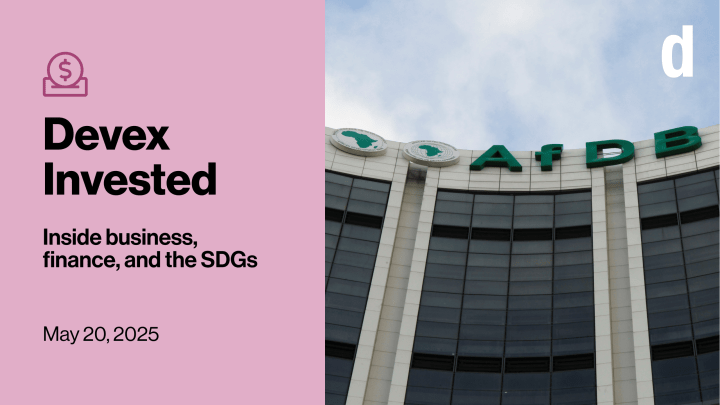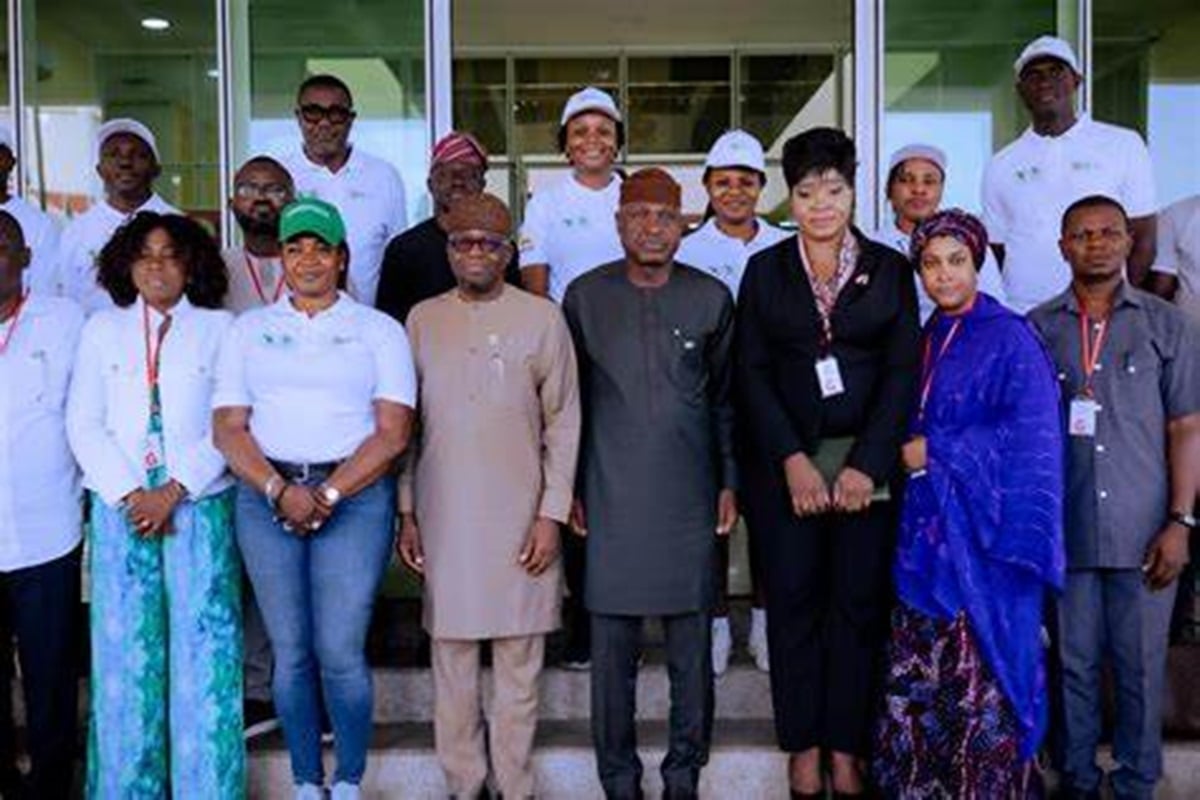
For the past decade, the African Development Bank has been Akinwumi Adesina’s bank. The bespectacled leader known for his signature bow ties led the bank to considerable growth. , more than triple what it was when he took up the job.
But as his second term expires, . That man or woman is set to inherit the bank at a pivotal moment for the continent and the institution. African leaders are seeking to reduce their dependence on aid as budgets shrivel and the bank tries to raise capital for its fund for the lowest-income countries. That may face headwinds – in his recent “skinny” budget, U.S. President Donald Trump took aim at that fund and proposed eliminating the United States’ contribution.
So who might succeed Adesina in leading AfDB? My colleague Ayenat Mersie profiled the five candidates vying for the job ahead of the election on May 29.
: He’s a self-proclaimed “unconventional candidate” who believes that AfDB needs a leader to overhaul how the institution works from the inside out, which includes staying in Abidjan — the bank’s headquarters — and working through budget, talent, and the plumbing to speed up decision-making at the bank. If that sounds familiar, it's because it echoes many of World Bank President Ajay Banga’s early efforts at his own institution. Maimbo coincidentally worked at the World Bank for two decades, including as chief of staff to Banga and former president David Malpass. by “doubling down on revenue generation,” including by tapping local pension funds and African businesses.
He’s a former Senegalese government minister, AfDB vice president, and sovereign wealth fund CEO. The economist says he’ll focus on streamlining the bank to make it more efficient and better positioned to support the private sector. He believes the bank should help countries improve their tax systems, and in helping build investment tools that . AfDB should also be a connector and a facilitator — a trusted partner for governments and investors alike.
: She’s served as chief finance officer and until recently a senior vice president at AfDB, and if elected she . She helped pioneer hybrid capital at the institution, blending elements of debt and equity, allowing the bank to raise long-term financing beyond shareholder contributions, she tells Devex. Her vision: A bank that , that returns to its founding purpose of infrastructure investment, expands regional partnerships, and embraces financial innovation.
A Mauritanian economist, former minister, and president of the Khartoum-based Arab Bank for Economic Development in Africa, he wants the bank to be more assertive in unlocking the continent's own financial potential. , better coordinating financial institutions on the continent, and improving private capital mobilization. Two pledges: A high level forum on retooling financial instruments and de-risking investments; and consultations with youth, women, and think tanks.
He’s a former governor of the Bank of Central African States and president of the Development Bank of Central African States. The former Chadian minister of finance and infrastructure wants the bank to . His focus: The bank needs to do more, move faster, and work smarter.
Inside the race to lead the African Development Bank
African Development Bank hopefuls outline competing visions
Amadou Hott — African Development Bank should focus on jobs, innovation (Pro)
, we’ll explore how philanthropic networks help shape funder strategies and unlock pooled capital and how implementing organizations can navigate and engage with these networks. Register now to be a part of the discussion.
And , as part of our event series leading up to the Financing for Development conference in Seville, Spain, we’ll be joined by Vera Songwe, Homi Kharas, and Rick Samans to discuss how MDBs' unique ability to multiply scarce taxpayer funding through capital markets makes them the last viable financing vehicles standing in this time of dwindling bilateral aid. Save your spot now.
Back in November, the United Kingdom government pledged nearly £2 billion to the World Bank’s International Development Association, the bank’s fund for the lowest-income countries. But in February, the Labour government announced it was cutting the aid budget — and that contribution is now under review, Devex contributor Susannah Birkwood reports.
“This decision is the first sign of the to the international aid budget,” says Adrian Lovett, executive director for the U.K., Middle East, and Asia Pacific at the ONE Campaign. “Unless the 40% aid cut is reversed, there simply will not be enough money to do this without taking funds from other life-saving work.”
But some , even if it means spreading out payments, offering loans or guarantees, or supporting IDA in other ways. Maybe this is all a negotiating tactic? That’s what Ian Mitchell of the Center for Global Development suggests, adding that it was designed to put pressure on the Home Office to reduce spending on hosting refugees and asylum-seekers domestically, which accounted for about 20% of aid spending in 2024.
We’ll see what happens, but U.K. development minister Jenny Chapman told members of Parliament last week that . “In a world where we’re losing almost half the budget, everybody gets a cut basically,” she said. So maybe don’t hold your breath for a full contribution.
Will the UK renege on its pledge to IDA?
The United Nations Office for Disaster Risk Reduction is launching a new financial instrument that tries to turn disaster prevention into a win-win. The new bond, called a contingent resilience-linked bond, tries to for municipalities and countries that meet specific resilience targets, such as building sea walls or putting electrical lines underground, within a certain time frame, my colleague Jesse Chase-Lubitz reports.
The aim is to then , an area that has historically been underinvested since it doesn’t usually generate a profit. The bond structure would allow issuers to lower their long-term financial risk while encouraging resilient infrastructure.
It’s still early days but one of the people behind the idea, Mathieu Verougstraete, head of infrastructure and finance at UNDRR’s resilience unit, tells Devex that too much of financing is focused on disaster risk. “ to reduce the likelihood that it will happen,” he says.
But some experts are skeptical that this new instrument will work. Finding an institution that will fully guarantee these types of bonds is going to be difficult, and “evidence shows that the market does not price partial guarantees appropriately,” says Sebastian Espinosa, managing director at White Oak Advisory, which advises governments and public sector institutions on sovereign finance and debt management.
Espinosa is also and thus less likely to be widely implemented.
How to make climate disasters pay (Pro)
+ A offers deeper analysis of the evolving development sector, exclusive events and conversations with sector leaders on timely issues facing the aid world in these dire times, access to the world’s largest global development job board for career resources, and more. Try it out today by signing up for a 15-day free trial.
Last week, we wrote about how the Asian Development Bank, which had branded itself “Asia and the Pacific’s climate bank” seemed to be shying away from that title. After that piece was published, an ADB spokesperson responded to our earlier request for comment — saying that “ADB is fully committed to addressing long-term development challenges, including climate change. , as one of five priority areas.”
The spokesperson went on to say that from ‘Climate Bank of Asia and the Pacific’ to ‘Solving Complex Challenges Together’” on March 5, shortly after its new president took office. “By introducing our new positioning, we emphasize our determination to help our members address their complex development challenges in all five priority areas, including climate change.”
Is ADB still Asia and the Pacific’s climate bank?
The chimera of . [The Economist]
European nations back . [Bloomberg]
Millennium Challenge Corporation’s . [Devex]
, hurting foundations. [Devex]
Who’s funding the World Health Organization? [Devex Pro]
Jesse Chase-Lubitz contributed to this edition of Devex Invested.









